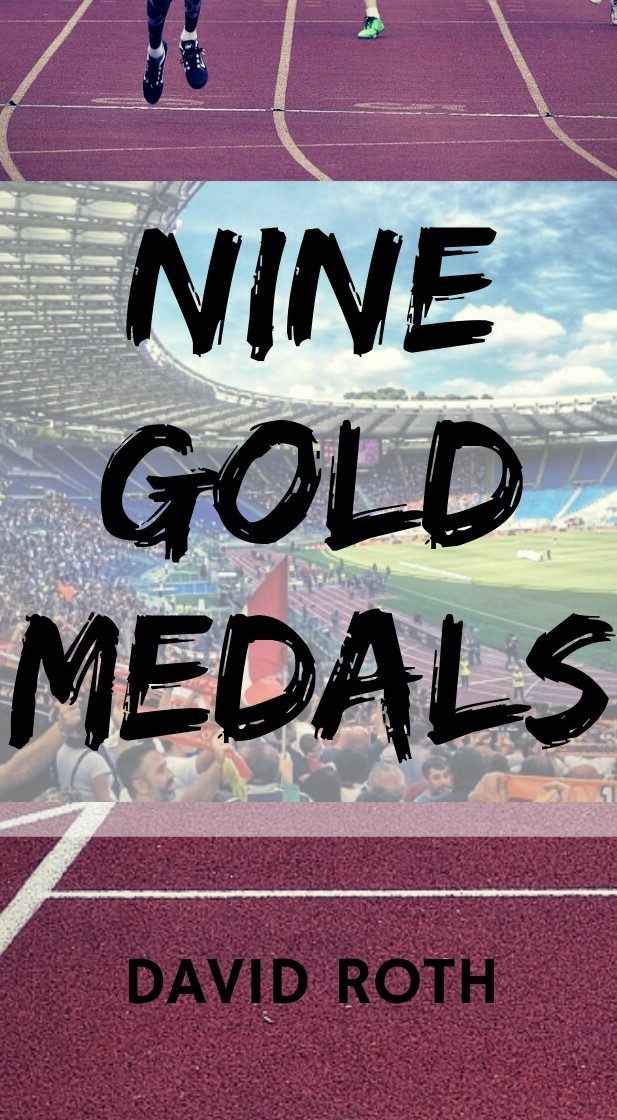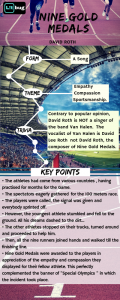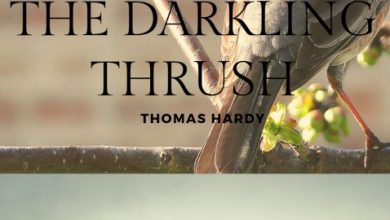
Nine Gold Medals | SUMMARY
Nine Gold Medals provides an account of how various athletes had come from many countries to take part in a Special Olympic Games. The grand day approaches when the athletes must prove their mettle and show the world that they have not toiled in vain. The nine athletes position themselves, alertly waiting for the sound of the gun. The signal is given, the gun explodes and all of them dash forward to make a run of their lives. However, the youngest among them gives out a sharp cry. He has fallen on the ground, with all his efforts and years of training gone to waste. What follows next is both unforeseen and unprecedented. The eight other athletes stop at the tracks, turn around and proceed to help him. They choose to help their fellow competitor despite the fact that they have invested great time, energy and effort for this very race. The nine athletes join hands and carry on. The hundred meter is race is reduced to a walk and the ‘race’ is completed in a grand gesture which perfectly complements the banner of “Special Olympics”. In appreciation of their compassion and empathy, all the nine players are awarded a gold medal each. The poem ends on a note of optimism saying that words can’t express the beauty of the gesture and the happiness of the athletes at having realized something greater than themselves.
Go No Time? Check out this 30 sec Revision by Litbug

Nine Gold Medals | ANALYSIS
Nine Gold Medals | First three stanzas
” The athletes had come from so many countries
To run for the gold, for the silver and bronze
Many weeks and months in training
All building up to the games.
All round the field spectators were gathered
Cheering on all the young women and men
Then the final event of the day was approaching
The last race about to begin.
The loudspeakers called out the names of the runners
The one hundred metres the race to be run
And nine young athletes stood there determined
And poised for the sound of the gun.
The first and second stanzas of the poem capture the grand scale of the event as well as the effort that has been put in by the athletes. We are told that the athletes had come from “so many countries” to vie for “the gold, for the silver and bronze“.
The athletes had trained for “weeks and months” in order to realize their dreams. The first two stanzas effectively capture the dreams and aspirations of the competing athletes and describes the effort they had put in the form of months of training before the game.
The second and third stanzas capture the great gusto and fanfare of the event, with the spectators gathered around the field cheering for their favourite athletes. The loudspeakers blare out calling the names of the players, all of whom enter the field, determined to win the race. They take their positions, alert and focused, eagerly waiting for the sound of the gun.
Nine Gold Medals | Fourth and Fifth stanzas
The signal was given, the pistol exploded
And so did the runners on hearing the sound
But the youngest among them stumbled and staggered
And fell on his knees to the ground.
He gave out a cry of frustration and anguish
His dreams and his efforts dashed in dirt
But as sure as I’m standing here telling the story
Now it’s a strange one,but here’s what occurred.
The fourth and fifth stanzas capture the climax of the narrative. Note the quick pace of the rhythm which mimics the climax:
“The signal was given, the pistol exploded And so did the players on hearing the sound.”
Also note the rhythm of the lines which creates momentum for the race to begin:
The signal was given, the pistol exploded
And so did the runners on hearing the sound
The manner in which the players sprint off is compared to the explosion of the gun which recreates the atmosphere of the race with an effective aural imagery.
However, the youngest among the players staggers on and falls on the ground, giving out a sharp cry – all his and dreams have been shattered and his efforts wasted.
Nine Gold Medals | Sixth and Seventh stanzas
“The eight other athletes stopped in their tracks
The ones who had trained for so long to compete
One by one they turned round and came back to help him
And lifted the lad to his feet.
Then all nine runners joined hands and continued
The one hundred metres reduced to a walk
And the banner above that said “Special Olympics”
Could not have been nearer the mark.
The sixth and seventh stanzas describe how the competitors made the compassionate gesture of helping their fellow athlete instead of focusing on winning the gold medal. Roth emphasizes that the athletes were the same ones who had “trained for so long to compete”. This collective gesture of empathy and goodwill leads to a fellowship due to which the hundred meter race is “reduced to walk“.
It is here ( and not anytime earlier ) where Roth slips in the fact that the incident had taken place in “Special Olympics” game and furthermore, does so by making the point an incidental one . By placing this fact right at the end and not the beginning, Roth very skillfully shifts the focus from the condition of the athletes and places it on the magnanimity of their gesture. In appreciation of the compassion and empathy, all the athletes are awarded the gold medals and the event ends with not one but nine gold medalists. Roth ends the poem by conceding that words can’t express the generosity of the gesture of the athletes who made it possible to convert an individual’s tragedy into collective happiness.
We live in a world where phrases like “a rat race” and “dog-eat-dog world” are frequently echoed by the hollow echo-chambers who walk amidst us. This world of ours is also fraught with weather-worn folks who repeat axioms like “life is a race” and egg-on their kids to run faster and fulfill their sole task of turning the wheel more rapidly in the laboratory of life. Nine Gold Medals transcends such verbal garbage masquerading as “sound advice” to show that life is much more than just a race, that with cooperation and fellow feeling, we can create something more beautiful, meaningful and greater than our immediate individual selves.
Nine Gold Medals : About the author
A musical artist from Chicago, Illinois David Roth is a prominent singer and songwriter of the American New-folk genre. His poetic lyrics, anecdotal narratives, keen observation and a celebration of life come alive with the melody of the chords he conjures in his guitar, often resulting in the creation of something beautiful. In his own words:
“One of the reasons why I write songs and play music is to try to bring more beauty into a world that needs more beauty.”
Some of his important songs include Nine Gold Medals, May the Light of Love, Be Kind to Yourself and Dragon to Butterfly, among others. One must be aware of false information about David Roth in his relation to the song Nine Gold Medals.
Before we proceed any further, we must state that unlike popular belief, Nine Gold Medals is NOT composed by the vocalist of the band Van Halen as printed in some books. The vocalist of Van Halen is David Lee Roth an altogether different singer. Nine Gold Medals is written by David Roth, the singer-songwriter as mentioned in this short About the Author section of Litbug. While we enjoy this gem of a song which deals with compassion and empathy, it becomes our responsibility to stop the gross misattribution of the piece which is a great crime we commit against the artist. We must give David his due.




